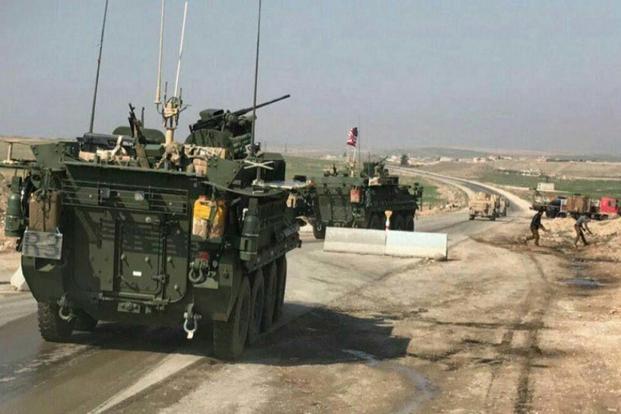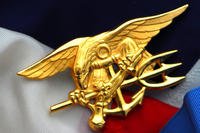Stryker combat vehicles and up-armored Humvees carrying additional U.S. troops sent into Syria were patrolling the streets of northeastern Manbij on Monday in an effort to deter a multi-sided battle for the city, the Pentagon said.
"We want to have a visible show that we are there" in Manbij to discourage forces of the regime of Syrian President Bashar Assad backed by Russia, or Turkish military forces partnered with a local militia, from any moves against the crossroads town that could take pressure off the common ISIS enemy, said Navy Capt. Jeff Davis, a Pentagon spokesman.
"They're not looking to start a fight with anybody," Davis said of the U.S. troops in Manbij.
"They're looking to prevent" any conflict with the Manbij Military Council, the mostly Syrian Arab group that has policed Manbij since the ouster of the Islamic State of Iraq and Syria last August, he said.
The U.S. move into Manbij appeared initially to be having the intended effect -- at least with Turkey, which has been threatening for months to attack the city to oust what Turkish officials claim to be elements of the Syrian Kurdish YPG, or People's Protection Units. Turkey has charged that the YPG has links to Kurds behind an uprising in southeastern Turkey.
Turkish Prime Minister Binali Yildirim said Monday that Turkey would not plan a military campaign against Manbij without consulting with the U.S. and Russia. Without such coordination, "there wouldn't be much of a result and things could get more complicated," he told a Turkish broadcast station.
Last week, Turkish President Recep Tayyip Erdogan said Manbij would be the next target in the campaign the Turkish military is conducting inside Syria with Free Syrian Army partners to clear border areas.
With U.S. troops in Manbij, there is no need for Turkish, Russian or Syrian regime forces to move on the city, Davis said.
"This is a new effort. This is the first time we've had to do something like this, which is to ensure that we are out there as a visible symbol that the enemy is cleared out of Manbij," Davis said. "There is not a need for others to advance on it in attempts to 'liberate' it."
Davis declined to say how many U.S. troops are in Manbij but said they were in addition to the 503 mostly Special Forces troops authorized to be in Syria under the "Force Management Level" (FML) set by the administration of former President Barack Obama.
Army Lt. Gen. Stephen Townsend, commander of Combined Joint Task Force-Operation Inherent Resolve, has authority to request troops in addition to the FML through his chain of command, Davis said.
Townsend's immediate superior is Army Gen. Joseph Votel, commander of U.S. Central Command, who was in Syria last month and said additional U.S. forces might be needed to back up the eventual assault on the ISIS stronghold of Raqqa, about 71 miles southeast of Manbij.
It was not immediately clear if Votel signed off on Townsend's request for additional troops for Manbij, or the request went to Defense Secretary Jim Mattis and ultimately the White House.
The first signs of the U.S. move into Manbij came over the weekend when photos posted on social media showed Strykers and Humvees flying U.S. flags advancing toward the town.
When asked whether the U.S. troops in Manbij are on a new mission apart from the train, advise and assist role with local partners against ISIS, Davis said, "It is, absolutely."
He declined to call the U.S. troops in Manbij "peacekeepers," but said they are "a visible reminder for anybody looking to start a fight."
Davis said the deployment of U.S. troops to Manbij is not expected to have any effect on the main U.S. effort to support a combined Syrian Arab and YPG force that is closing on Raqqa.
Turkey has warned the U.S. against allowing the YPG to be part of the eventual assault on Raqqa, but Townsend said last week that the group's participation is essential to the mission.
"We encourage all forces to remain focused on the counter-ISIS fight and concentrate their efforts on defeating ISIS and not towards other objectives that may cause the coalition to divert energy and resources away from Raqqa," he said last week.
Despite Turkish objections to having the YPG involved in the Raqqa assault, "I expect Kurds will participate in the operation in one -- one form or fashion," Townsend said in a video briefing from Baghdad to the Pentagon. "So yes, I expect there will be some Kurds that will participate."
-- Richard Sisk can be reached at Richard.Sisk@Military.com.



























